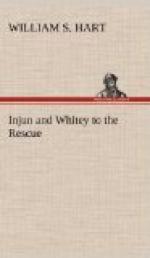Whitey now discovered a new trait in his friend Injun—persistence. Injun was very determined in his efforts to get something on Dorgan. He had made up his mind that Dorgan had stolen Monty, and his mind was not like a bed that could be unmade easier than it could be made up. At first Whitey thought that this was a phase of the Indian’s well-known desire for vengeance, but Injun didn’t seem to be vindictive in the matter. He didn’t even mention Dorgan’s attempt to put him out of the tent. Whitey was interested in this trait of Injun’s and liked him the more for it. If Injun was a stick-to-itive fellow, so was Whitey. He would show Bill Jordan that he couldn’t make a fool of him and get away with it.
And finally, as a reward of perseverance, Injun did get something on Dorgan, though it didn’t amount to much. Injun averred, and it may have been true, that Monty had a deadly fascination for Dorgan; that when Monty was around, Dorgan couldn’t keep his eyes off him. And Injun said that he saw Dorgan approach Monty in the corral, probably to admire him more closely, and that Monty showed great hatred for Dorgan; laid back his ears and bit and kicked at Dorgan.
“Him no like um. Him must know um,” declared Injun, being firmly convinced that Monty’s actions indicated a close acquaintance with Dorgan.
However, Monty couldn’t give any spoken evidence that Dorgan had stolen him, so there the matter rested. And there was something else to occupy the boys’ minds. There seemed to be a vague feeling of unrest at the ranch. There always had been bad blood between Gil Steele and the workers. He not only was a hard taskmaster, getting the last ounce of work out of the men, but he was close in money matters, and had all sorts of fines and penalties he imposed when the men were late or neglected their work. There was continual wrangling and haggling.
With this sort of thing on the surface you will understand that it would be easy to stir up more serious trouble from underneath, and something of the sort was going on. It was something Whitey couldn’t put his hand on, but he could read it in signs shown by some of the men. And there were mysterious meetings and gatherings of the disaffected ones.
Of course, Injun was quick to sense all this, and had no scruples about butting in and finding out all about the trouble. As bad examples are as catching as good ones, and more so, Whitey joined Injun in his investigations. So behold! A dark night on the prairie. A tent showing only a streak of yellow light where the opening folds did not quite meet. Two boys lying on their stomachs near the edge of the tent, industriously listening.
This was not their own tent. There seemed to be few grumblers in that. It was the tent in which Henry Dorgan was housed. And listen as they might, and sharp as Injun’s ears were, they heard nothing definite. Just murmurs, an occasional oath or two, and what might have been threats, in louder tones. It was very discouraging. So at last they returned to their own tent, to the yarn-spinning threshers and the silent old cowpuncher.




